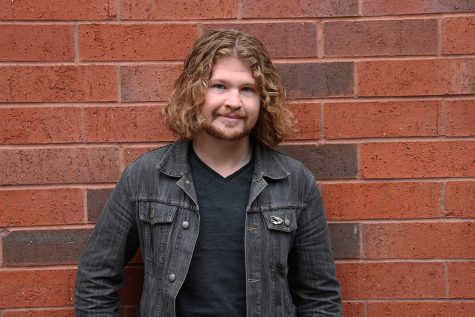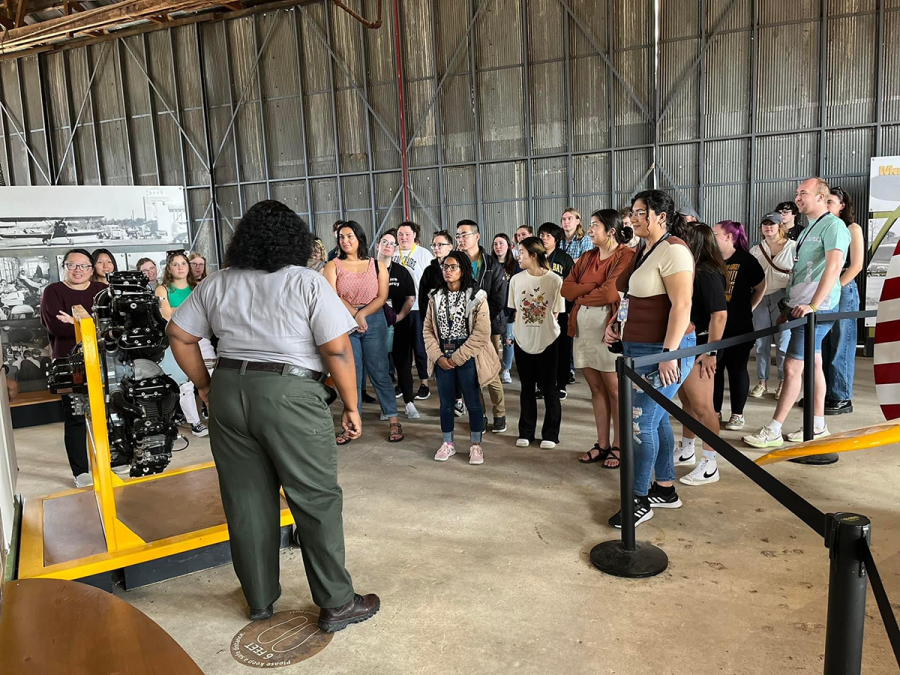UW-Eau Claire to host fifteenth year of Civil Rights Pilgrimage
New destinations include Money and Oxford, Mississippi
Photo by UW-Eau Claire
Students on the Civil Rights Pilgrimage learn about history in Tuskegee.
On March 17 through Sunday, March 26, UW-Eau Claire will send 56 students on its 27th Civil Rights Pilgrimage. Students on this trip will visit sites of importance in the Civil Rights Movement, such as Birmingham and Selma, Alabama, Memphis, Tennessee and more.
New destinations this year include Money, Mississippi — the site of Emmet Till’s murder — and Oxford, Mississippi. Another recent addition to the trip is Tuskegee, Alabama.
One frequent attendee to the pilgrimage is Jodi Thesing-Ritter, director of the Center for EDI Training, Development and Education, who teaches a course that goes on the trip. According to Thesing-Ritter, the pilgrimage is one that has been deeply impactful to her.
“The first trip that I went on in 2008 really changed the trajectory of my life,” she said. “My desire to learn more so I could do better really began on that first trip and it sent me on a course of deep learning and inquiry into historical issues of social injustice.”
Overall, she said, the majority of the trip is student-led. Logistics surrounding travel and activities are handled and organized by four student coordinators.
“They set up all of the speakers, all of the tours that we go on. They make the hotel reservation. So I helped facilitate and guide them but it’s a student-led trip which is, I think, one of the parts of the trip that makes it especially interesting,” Thesing-Ritter said.
Over the course of the pilgrimage, she stated, students not only visit sites but actively engage in relevant conversations and activities, such as activities on the bus, participating in discussions, watching films and documentaries and talking to civil rights leaders.
“It’s like a rolling classroom,” she said.
Thesing-Ritter emphasized that the impact of the trip is cumulative, brought on not by any one destination but by the combined effect of the whole pilgrimage. However, one destination that particularly stands out to her is Selma, Alabama.
“We’ve developed really deep personal relationships with the people that we see there and the city itself. And so Selma is a place of real connection for me,” she said.
Thesing-Ritter is not the only pilgrimage attendee who cites Selma as an impactful location. The lead coordinator for the March pilgrimage is fourth-year criminal justice student FranChesca Riley, who shared similar sentiments regarding the location.
“The most impactful part of this trip for me is definitely our time in Selma, Alabama. I have been a coordinator since 2019 and every year I have chosen to coordinate our time in Selma because of how powerful it is to me,” Riley said.
While in Selma, Riley explained, students receive a tour and history lesson surrounding Bloody Sunday from civil rights activist Joanne Bland.
“Miss Joanne Bland is the reason I changed my major. I remember her telling us that simply put we are one piece to a much bigger puzzle, and no matter how small, that puzzle would be incomplete without that piece,” Riley said. “It was then that I realized that I can in fact be a part of this change I so desperately wanted to see.”
Another activity students will see in Selma is The Soul Prints of Our Ancestors, a slavery reenactment.
“It is not only emotionally and spiritually moving, but Miss Afriye does it in a way that makes you release anything holding you back from growing and truly embracing who you are in every aspect,” Riley said.
Overall, Riley noted, the pilgrimage is an impactful opportunity not only for students, but for the wider community.
“I just really want everyone to recognize that this trip is not just important and beneficial for college students,” she said. “It’s a time to connect with and learn from people from diverse backgrounds, a time to further your understanding and connect with history and simply emerge yourself in something new.”
After four years, this pilgrimage will be Riley’s last, a fact that she said brings bittersweet feelings.
“The pilgrimage has been every part of my journey into adulthood that my academics has been and it has been very influential in me finding myself as an African American woman and as a mental health professional,” she said. “I just pray that the community and the university continue to pour into this trip the way it deserves.”
Registration for the 2024 Civil Rights Pilgrimage will open Sept. 15.
Flake can be reached at [email protected].

Liam Flake is a third-year English literature and journalism student and this is his third semester on The Spectator. His passions include reading, tea, corvids and maps. He aspires to travel the world in a van and write about the experience. In his free time Flake can be found in the library or around town in a hammock.

